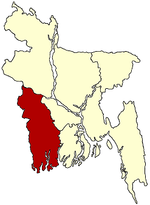Fakirhat Upazila
| Fakirhat ফকিরহাট | |
|---|---|
| Upazila | |
 Fakirhat | |
| Coordinates: 22°46.8′N 89°42.5′E / 22.7800°N 89.7083°ECoordinates: 22°46.8′N 89°42.5′E / 22.7800°N 89.7083°E | |
| Country |
|
| Division | Khulna Division |
| District | Bagerhat District |
| Area | |
| • Total | 160.68 km2 (62.04 sq mi) |
| Population (1991) | |
| • Total | 123,956 |
| • Density | 771/km2 (2,000/sq mi) |
| Time zone | BST (UTC+6) |
| Website | Official Map of Fakirhat |
Fakirhat (Bengali: ফকিরহাট) is an Upazila of Bagerhat District in the Division of Khulna, Bangladesh. It is famous for "Sixty Dome Mosque" (ষাট গম্বুজ মসজিদ) of medieval age and the Khan Jahan Ali mazar.
Geography
Fakirhat is located at 22°46′50″N 89°42′30″E / 22.7806°N 89.7083°E . It has 24286 units of house hold and total area 160.68 km².
Demographics
As of the 1991 Bangladesh census, Fakirhat has a population of 123956. Males constitute 51.12% of the population, and females 48.88%. This Upazila's eighteen up population is 67565. Fakirhat has an average literacy rate of 43% (7+ years), and the national average of 32.4% literate.[1]
Administrative
Fakirhat has 8 Unions/Wards, 67 Mauzas/Mahallas, and 87 villages.
Fakirhat Upazila (bagerhat district) with an area of 160.68 km2, is bounded by rupsa and mollahat upazilas on the north, rampal upazila on the south. bagerhat sadar and chitalmari upazilas on the east, batiaghata and Rupsa upazilas on the west. Main river is Rupsa, Bhairab and Chitra. Notable Beels are Kalkolia and Koltita.
Fakirhat (Town) The area of town is 22.09 km². It has a population of 23476; male 51.93%, female 48.07%. The density of population is 1063 per km2. The literacy rate among the town people is 47.4%. The town has one dakbungalow.
Administration Fakirhat thana was established in 1869 and was turned into an upazila in 1983. It consists of 8 union parishads, 67 mouzas, 87 villages.
Archaeological heritage Shiva Mandhir and Khanjahania Mosque.
Historical events During the War of Liberation in the Razakars made a surprise attack on the camp of the freedom fighters at village Deyapara of Shuvadia Union in which many people of both sides were killed and wounded.
Marks of War of Liberation Memorial monument 3, memorial sculpture 1.
Religious institutions Mosque 170, temple 66, sacred place 1, most noted of which are Khanjahania Mosque, Dohazaree Shiva Mandhir, Manasabari Kalibari.
Population 123956; male 51.12% and female 48.87%; Muslim 71.55%, Hindu 28.43% and others 0.02%.
Literacy and educational institutions Average literacy 43%; male 49% and female 36.7%. Educational institutions: college 3, technical college 1, non-government high school 24, government high school 2, madrasa 27, government primary school 53 and non-government primary school 20. Noted institutions: Mulghar Government High School (1857), Bahirdia High School (1892).
Cultural organisations Cinema hall 1, theatre group 5, women's organisation 30 and rural club 25.
Main occupations Agriculture 38.15%, fishing 2.81%, agricultural labourer 16.94%, wage labourer 6.07%, commerce 14.86%, transport 3.01%, service 8.3%, others 9.86%.
Land use Arable land 10072.03 hectares, fallow land 5804.53 hectares; single crop 64%, double crop 30% and treble land 6%.
Land control Among the peasants 33% are marginal, 35% small, 25% intermediary and 7% rich.
Value of land Market Value of the first grade of land Tk. 6000 per 0.01 hectare.
Main crops Paddy, potato, betel leaf and vegetables.
Extinct and nearly extinct crops Mustard seed, sweet potato and pulses.
Main fruits Coconut, boroi, betel nut and banana.
Fisheries, dairies and poultries Fishery 7463, dairy 33, poultry 47.
Communication facilities Roads: pucca 61 km, semi pucca 10 km and mud road 563; waterways 30-nautical-mile (56 km); railways 10 km; railway station 3.
Traditional transport Bullock cart and palanquin. These means of transport are extinct or nearly extinct.
Manufactories Ice factory 1, oil mill 10, rice mill 20, frozen shrimp preservation 2.
Cottage industries Bamboo work 85, goldsmith 52, blacksmith 65, wood work 136, potteries 30, tailoring 125 and kantha sewing 15.
Hats, bazars and fairs Hats and bazars are 17; fairs 6, most noted of which are Fakirhat, Lakhpur hat and Atraka Baishakhi Fair.
Main exports Coconut, betel leaf, shrimp, and betel nut.
NGO activities Sukhee Manush, Drishtanto, Prodipon, Prisam, Viko Bangladesh, Nabolok, asa, brac, grameen bank and CARE.
Health centres Upazila health complex 1, family planning centre 8, satellite clinic 1 and community clinic 7.
BIVASH DAS,CHITALMARI, BAGERHAT.
References
- ↑ "Population Census Wing, BBS.". Archived from the original on 2005-03-27. Retrieved November 10, 2006.
